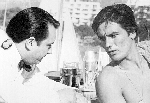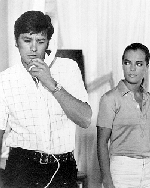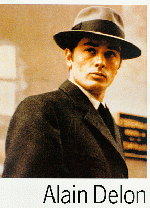
26 KBytes
His career as an actor, actually, is owed to his extraordinary physical attraction. He escaped from his miserable childhood at the age of 17 to join the army. Coming home from Indochina he looked for a job in Paris. He used to serve in Art Cafés where he could meet some actors and directors. Together with his unconventional friends, dressed in rented dinner jacket he admired the crowds of the Cannes Film Festival and just as in American dreams, he was offered a film contract. He was persuaded out of David Selznick's , the great American producer and scriptwriter, exclusive 7-year -lasting contract by Yves Allérget and Simone Signoret. They convinced Delon that the first experiences must not be gained in an absolute strange environment with language difficulties.
It took him three very hard years to reach the point of being one of the most popular actors in France. From the first this wonderful, kind boy could overcome obstacles due to his absolute attractive force and with great will-power he gained dramatic qualification for professional acting. After neoromantic, sentimental comedies in 1960 he got a role in the film called Lust for Evil, which determined all his further career. "The film is one of the best European crime stories: it shows how the complex relationships among people can become an inhuman game, its homoerotical atmosphere and the schizophrenic killer's attractive charm. The intensity of the film is similar to Hitchcock's films in the forties. Clément's pictures are soaked with sunshine, but they are still cool." (Rein A. Zonbergeld) The real sensation of the film is Alain Delon, in whom the duality of angel and devil incarnated. With this film a new period started in his career, which perfected in Visconti's and Antonioni's films. Delon became an international star, he introduced himself as a producer, bought race horse stables, founded airlines and from the boy, who suffered from hunger became a big bourgeois, living a noisy life with a lot of scandal.
The next determining point in his career was meeting and becoming friends with Melville. The script of the film called The Samurai was written by Melville especially for Delon. "It is absolutely obvious that I would not have been able to make this film with anybody else, only with him."-he remembers. "I was so sure in it that when he refused, because of his employment in Hollywood I simply put the script in my draw until the day.... And the day came!" From this legendary role he created his "cold angel image" (the film got the same title The Cold Angel in Germany) and he acted the sort of gangster who does not elicit antipathy or horror, but some kind of love. The Samurai was his 26th role (up till now he has played in more than 90 films) and as the critics say: "If he does not make more films none of the aspects of his ability would have been hidden." His playing is fully ripened, he will not conquer any further territories although he may vary or make them better. With this role he created the set, mask- like face, which later changed only a little. In Jeff Castello, the lonely gangster in the history of film art, he found his true role and his identity.
His prolific and sometimes greedy career is aimed at getting richer and richer. He chases art dreams, but at the same time he does not despair of success in popular films either. One of the peaks of his career is the film called Mr. Klein made in 1976. As Delon once said in one of his interviews: "Mr. Klein is the best film I have ever made as a producer and the most beautiful role I have ever played. The script was given to me by one of my friends who is a producer, after having held on to it for half a year. For two years it was impossible to find a director for it and I was slowly giving up hope of making this film. I like Losey very much and during lunch with him I told him my sadness about being unable to realize a certain plan. He would have read the script with pleasure, but he did not understand French so his wife had to translate it first. After a short time he called me up saying that he wanted to make the film." Mr. Klein had variable success in France. Delon was accused of betraying and showing a negative picture about French people's approach to the Jewish problem. But a well-known star must accept not only the criticism on his play but also his behaviour, statements, faith and every moment of his private life as well.
Delon is a lucky type as regards his being old. Time outshone his embarrassing beauty, he has became a matured attractive man. His private life has calmed down, he makes only films, gathers art treasures, keeps horses and he does big businesses. He is a happy father and husband.
Cinématheque Francaise in Paris organized a series of Delon's films last year. As I have got to know from my French colleagues Alan Delon appeared sometimes during the films, he searched the viewers' reaction in the dark. He inquired whether a little film museum (and not a big multiplex cinema) could sell out or not, whether the audience understood and liked his films. The great star, one of the living legends in the world of film history, showed his frail human face with this gesture. Perhaps we can rightly hope that the audience of Örökmozgó Cinematheque in Budapest still like one of the most defining actors in modern French film art.

23 KBytes

28 KBytes

14 KBytes

29 KBytes

19 KBytes

